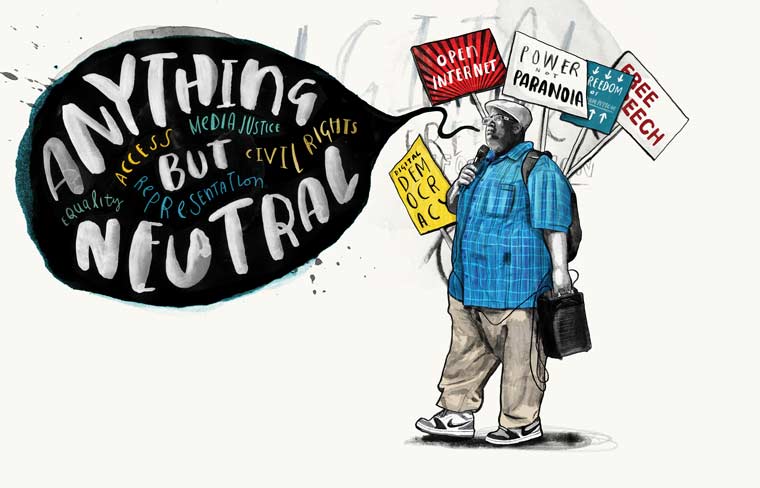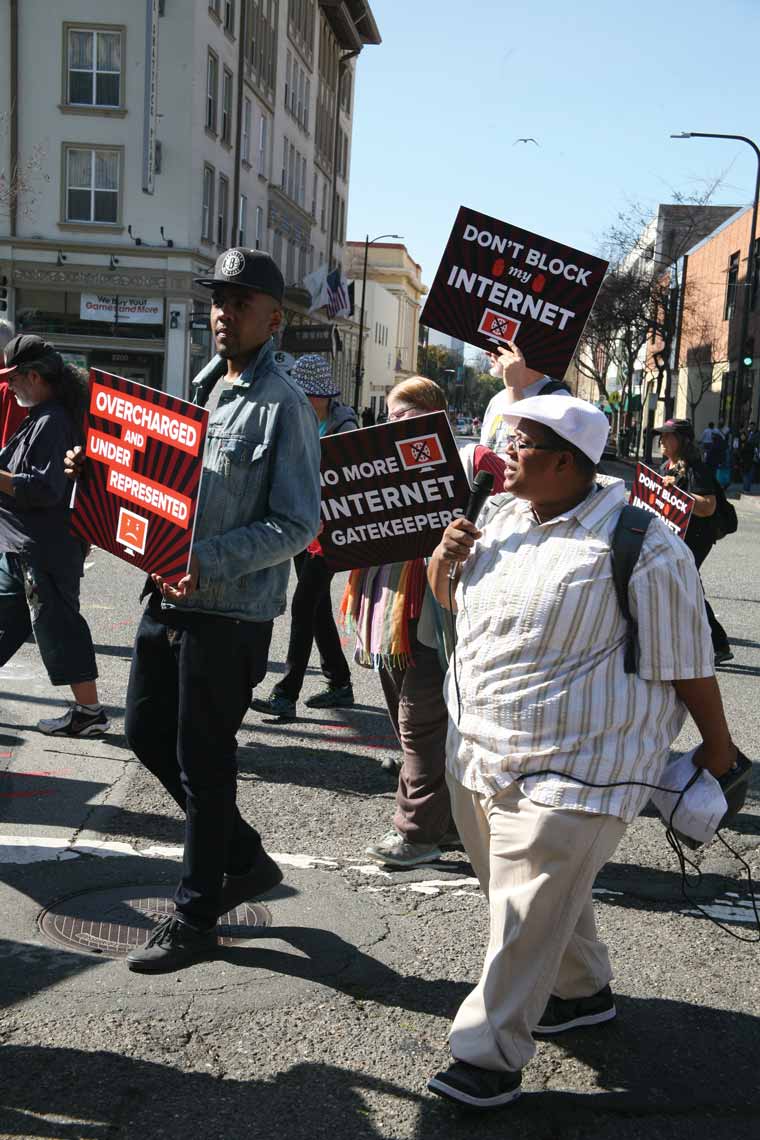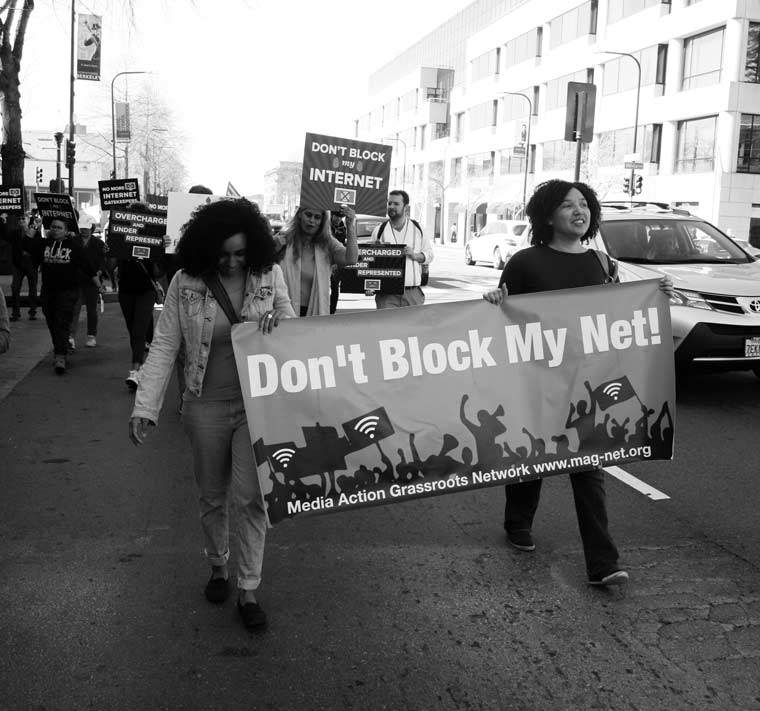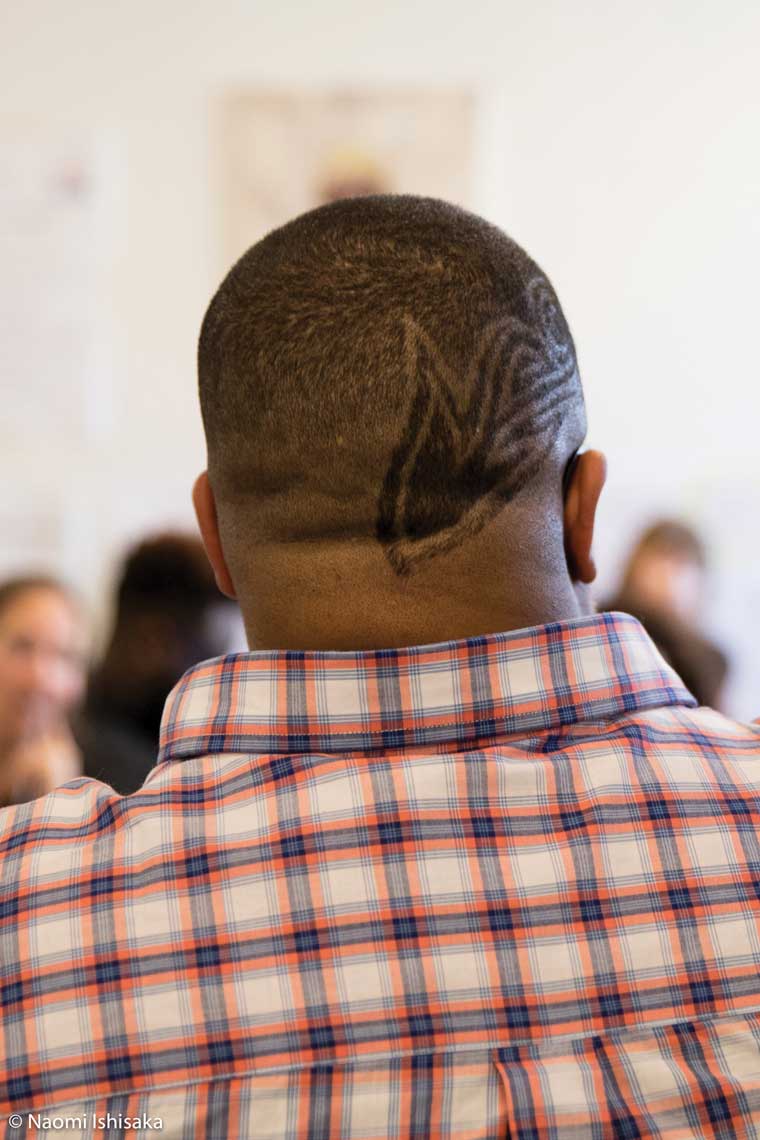Malkia Cyril ’96 sees open access to the Internet as a civil rights matter for the 21st century.
The United States government disagrees.

“Okay, let’s dive in.”
That was Malkia Cyril’s exhortation—to colleagues and, especially, to self—on entering the fight for something Cyril knew little about but sensed would become essential to underserved communities across the United States and around the world. That something was net neutrality, and if you don’t believe it’s an issue on par with movements like #BlackLivesMatter or #MeToo, Cyril ’96, the founder and executive director of the nonprofit Center for Media Justice, will quickly disabuse you of that notion.
“I describe net neutrality as the civil rights of, and free speech principles for, the Internet. It’s the set of rules that make sure the Internet can be used by all people,” says Cyril, who is gender nonconforming and prefers the pronouns “they” and “them.” Under the principles of net neutrality, the job of Internet service providers (ISPs) is to deliver information neutrally, without analyzing or manipulating it in any way. That means neither speeding up delivery for websites that pay higher fees nor slowing down (“throttling”) or blocking websites that pay less or express a point of view the companies disfavor.

Diving In
Cyril’s involvement in the cause began before it was a cause. When the 1996 Telecommunications Act allowed for the consolidation of radio station ownership, it appeared to Cyril and others to augur greater media consolidation overall. A few years later, the country’s largest telecommunications companies—Comcast, AT&T, Verizon, and others—began to lobby for consolidation in the Internet realm as well. That’s when Cyril realized the fight would be about more than just a lack of competition.
“I was specifically concerned that people of color and our voices would be excluded very systematically,” Cyril says. As an example, Cyril cites the black voters of Alabama who relied on the Internet in their grassroots campaign to elect Democrat Doug Jones to Jeff Sessions’ vacated Senate seat. And they note that other movements with a strong Internet platform, including #BlackLivesMatter, would suffer as well.
In 2008 Cyril founded the Center for Media Justice, based in Oakland, California, which fights for universal access to media and technology. That same year, the center joined a coalition of organizations working to preserve net neutrality. “At the time,” Cyril says, “we were one of the only groups in the coalition led by a person of color.” That was significant, Cyril says, because “in the fight for net neutrality, communities of color, rural communities, local communities, native people were not being well represented.”
In fact, Cyril believes we all stand to lose if net neutrality is not upheld. “Every person, not just in this country but across the globe, loses if net neutrality isn’t restored in the US,” Cyril says. Because the United States has global influence, Cyril believes a loss for net neutrality here “will make it more difficult for net neutrality to be won in other places and to be maintained in countries where it has been won, like India, Canada, and England.”
For a glimpse of what the Internet could look like should efforts like Cyril’s fail, consider that in 2005, before Canada strengthened its net neutrality rules, the Canadian ISP Telus blocked access to the website of a union that was threatening a labor strike against it.
In April 2015, bowing to pressure from activists like Cyril, the Federal Communications Commission issued the Open Internet Order, reclassifying the Internet—which had until then been considered an information service—as a public utility, subject to the kind of regulation that would make it difficult for providers to favor certain websites or Internet users. It was a big win for net neutrality, but any celebration would turn out to be premature.

Neutral No More
Less than three years later, in December 2017, the FCC voted to repeal parts of the Open Internet Order, once again classifying the Internet as an information service. The result was to effectively overturn net neutrality.
Asked what was behind the decision, Cyril answers with a single word: “Trump.” The laugh that follows is hearty but short lived. “Let’s be clear,” Cyril says. “The victory to win net neutrality took over 10 years. It was fiercely opposed by the big telecom companies, by many in the Republican Party, by members of the FCC. There wasn’t overwhelming support for net neutrality except in one place: the people. People want to be connected. They want unfettered access to one another.”
For Cyril and the Center for Media Justice, civil rights was an inextricable element of the fight for open Internet access, and much of the team’s work focused on winning support from the Tri-Caucus. A coalition of the Congressional Asian Pacific American Caucus, the Congressional Hispanic Caucus, and the Congressional Black Caucus, the group wasn’t initially supportive of net neutrality. “It took a decade of alliance-building to really change that dynamic,” Cyril says, “but today a majority of the Tri-Caucus supports net neutrality. That has been our main contribution to, and role in, this fight.”
In May the Senate voted 52–47 to overturn the FCC’s 2017 repeal of net neutrality, a move supported by both the Tri-Caucus and the NAACP. While a House vote is pending, the FCC’s repeal of net neutrality went into effect in June. Meanwhile, more than 30 states have introduced net neutrality legislation of their own, and a group of 22 states has sued the FCC over the repeal. Cyril remains hopeful: “Without that civil rights strategy, there would have been no 2015 victory, and there certainly can’t be any victory without it right now.”
Steven Renderos, organizing director at the Center for Media Justice, praised Cyril’s “leadership and powerful voice” in mobilizing groups such as #BlackLivesMatter, #NoDAPL, #NoMuslimBan, and #MeToo to fight for an open Internet. Cyril’s single greatest contribution, Renderos says, was to frame net neutrality as a matter of racial justice—“at a time when movements rooted in communities of color didn’t view it as such.”

A Fighting Spirit
A writer as well as an activist, Cyril credits their mother—an educator, a writer, and a member of the Black Panther Party—for introducing them to the role that culture plays in shaping politics. “I believe our lives—especially my life as a black, gender-nonconforming human being—depend very heavily on cultural change,” Cyril says. That belief also informs Cyril’s leadership in #BlackLivesMatter and in a more personal fight as well. Cyril’s wife, Alana Devich-Cyril ’97, a former classmate at Sarah Lawrence, is battling cancer, and Cyril offers that battle as an example of the need to change cultural attitudes about health care: “If people don’t believe she deserves health care, she dies.”
Cyril is convinced a Congressional vote to reverse the FCC’s action would offer the strongest undergirding for net neutrality, and one that would be the hardest to overturn. And if such a victory comes to pass? For Cyril, whose inclination is always to dive in, the fight will go on. “Will technology support and defend human rights, or will it be used primarily to expand and entrench authoritarian power?” Cyril asks, then offers an answer and a personal pledge: “That contest for power will never end—and I’ll be in it ’til the day I die.”
Written by Leslie Garisto Pfaff
Illustrated by Peter Strain
Photos by Naomi Ishisaka and Shilo McCabe